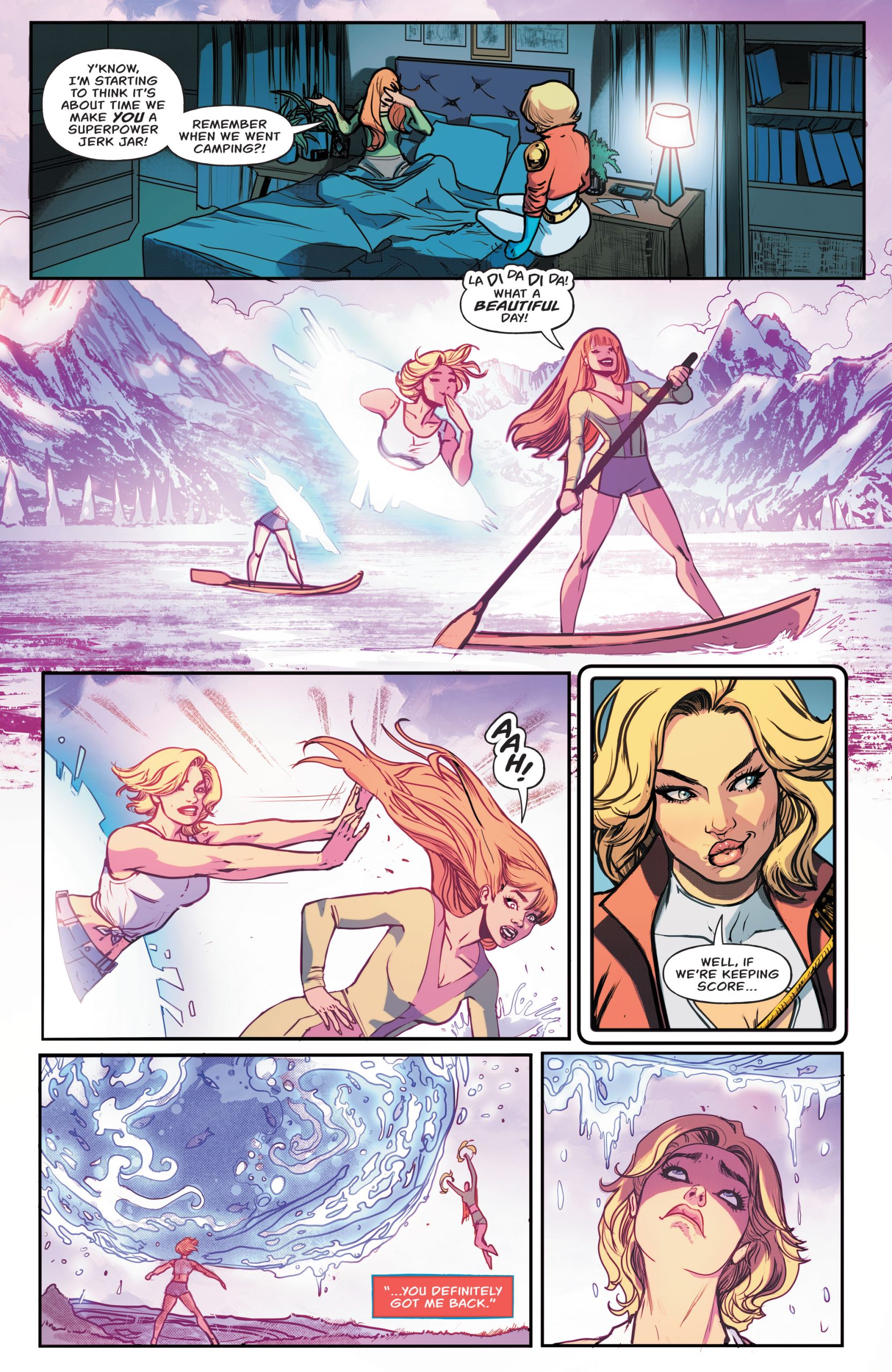Review: Power Girl #11 [Editor’s Note: This review may contain spoilers]
[Editor’s Note: This review may contain spoilers]
Writer: Leah Williams
Art: Adriana Melo
Colors: Romulo Fajardo, Jr.
Letters: Becca Carey
Reviewed by: Matthew B. Lloyd
Summary
PG finally has her date with Axel and she’s super nervous. Not surprisingly, the the date doesn’t go well and it’s not just the aquatic interloper at the Aquarium.
Positives
This Power Girl series has been difficult for longtime fans of the character. One has to look for little things to be happy about. Despite regular artist Eduardo Pansica doing a solid job on the book, Power Girl #11 features Adriana Melo. Melo doesn’t get a script with a lot of action, but like the covers that have been on this series Melo channels Power Girl’s personality that’s been missing since Leah Williams began writing the character. Melo brings a familiar energy that’s not really been in this series.

Melo does it through the body language and physical depiction of Power Girl in the opening sequence of the issue. Her confident presentation in the first few pages with Omen belies the dynamic that’s been set up between the characters in this series. Her facial expressions show some of the confidence and a bit of the brashness that was a hallmark of the character. Additionally, Melo depicts a Power Girl with a greater physical presence. She not only appears to be older, but Melo draws her with a more muscular, sturdier and mature physique.

Negatives
As Melo’s art brings something missing to Power Girl’s depiction, it also functions as a further reminder how bizarre Williams’ scripts are for the series. “Paige’s” concern over her date with Axel, while it completely fits Williams’ misguided characterization of Power Girl, continues to be confounding. It’s impossible to have a history with the character and find the substance of her character in this series anything but horrific.

Williams makes some uninspired choices in Power Girl #11 with the “Paige Stetler” identity. While her decision to put PG at the Daily Planet as a columnist seemed too close to Clark Kent’s private life, but now Lois Lane is moving “Paige” into the field so that she can be closer to danger where Power Girl can be of help. It’s another example of Williams completely misunderstanding the nature of Power Girl’s character and her raison d’etre. Making Power Girl more even more like Clark Kent/ Superman is diametrically opposed to the origins of her character. She made her own way without relying on her relationship to Superman and had a unique day job as an entrepreneur with her own software company, Starrware.
Negatives Cont’d
The dialogue in this issue is perhaps the worst we’ve seen in this series. There’s a string of terrible “sex” and potty jokes between PG and Axel on their date that are embarrassing for everyone involved. One must question the emotional age of the writer when reading these, as well as the characters she’s writing. Power Girl is supposed to be an adult, a mature woman, not a high school student. On top of that, the interaction between her and Omen once again is awful. Why is Omen her best friend? Again, Williams completely ignores the substance of Power Girl’s history with the JSA, a history Williams herself has referenced on her time writing the character. Anyone who knows the character, knows that the JSA is Power Girl’s family. Those characters are her friends and a family, not the Joanie-come-lately, Omen.

While it’s no surprise that Axel and Power Girl’s date goes awry, Power Girl is depicted so emotionally fragile that it takes the reader out of the story. Who is this character supposed to be? Williams has not left her with one ounce of dignity or confidence. These were always definitive aspects of Power Girl’s character. Williams should remember she didn’t create Power Girl. Power Girl has existed long before Williams wrote a single word for her. DC and Williams cannot expect this version of Power Girl to be seen as anything but a mistake. Continuing down this path with Power Girl only destroys the character.
Verdict
It’s not often that it feels like a comic book is being driven into the ground on purpose, but it certainly seems like that’s what’s happening with Power Girl. Power Girl #11 underscores this with a truly terrible story. The cover by Yanick Paquette and the first bit of the comic with art by Adriana Melo elevates it at the outset, but the story choices, wretched dialogue and the awful characterization that continue to plague Power Girl drag the issue down with an unbelievable weight. If only Williams could take the inspiration for this series from the covers we’ve seen from Gary Frank, Yannick Paquette, Dan Panosian and Adriana Melo’s subtle but insightful pages from the opening sequence in this issue.
